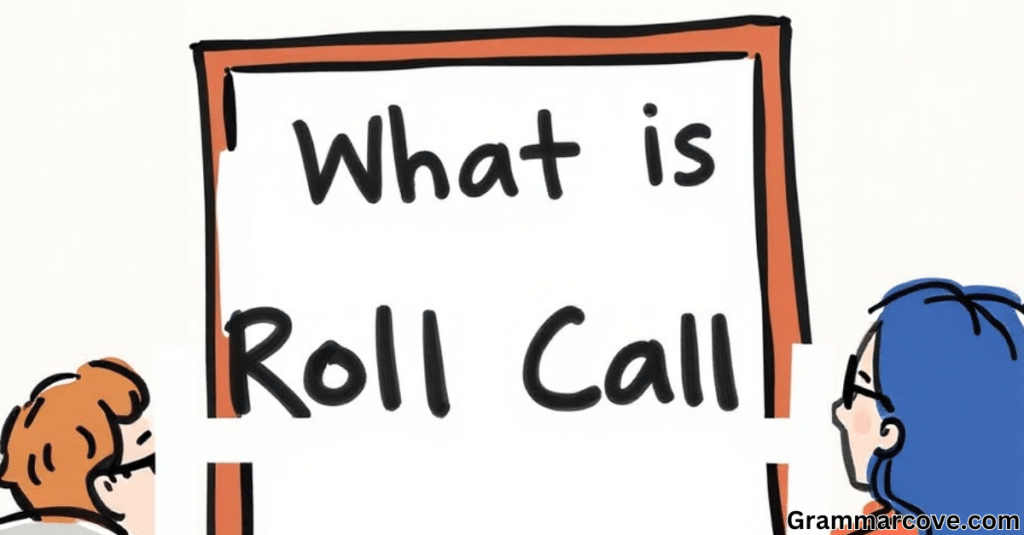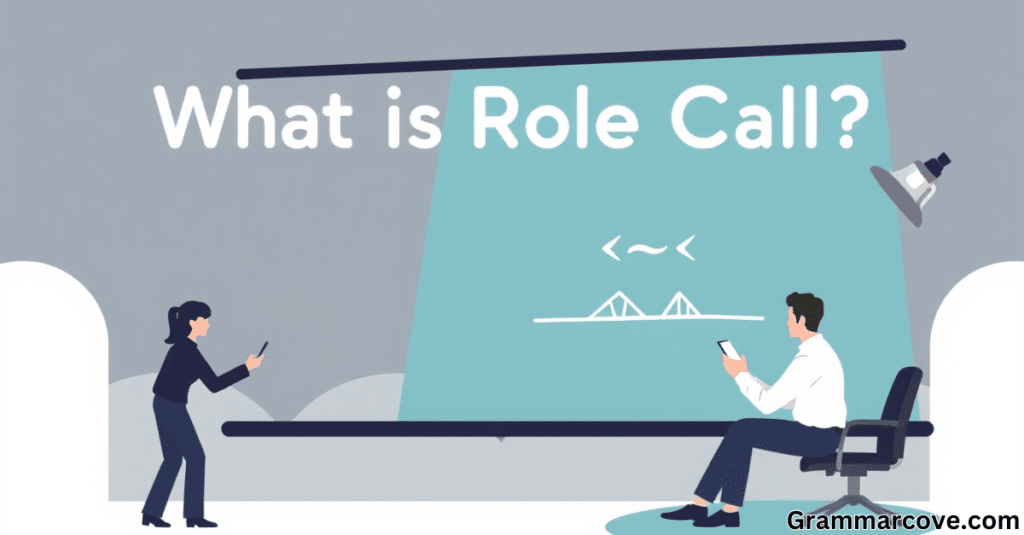When someone says “role call” or “roll call,” do you find yourself scratching your head? You might wonder: Which one is correct? These two terms are often used interchangeably, but they aren’t exactly the same. Understanding the difference between role call and roll call can help you communicate more clearly, especially in professional or formal situations.
In this article, we will explore these terms in detail, providing you with examples, clarifying common mistakes, and offering guidance on when to use each term.
Let’s break down the correct usage of both phrases and provide some practical examples, from schools to military and governmental settings.
What Is Roll Call?

Roll call refers to the process of calling a list of names to verify the presence of individuals. This is a widely used procedure in various organizations to ensure that everyone is accounted for.
For example:
- Roll call in schools: A teacher calls the names of students to mark their attendance.
- Roll call in Congress: Lawmakers’ names are called during a vote to ensure their presence and record their votes.
Roll call can be formal or informal, but it always involves the systematic calling of names to check attendance or confirm participation. It originated from the military and governmental practices but has spread to many other areas.
Table: Roll Call Usage in Different Settings
| Setting | Roll Call Purpose | Example Scenario |
|---|---|---|
| Education (Schools) | Attendance check for students | A teacher calls out names to see who’s present. |
| Military | Confirming presence of soldiers or personnel | A sergeant calls the names of soldiers during daily roll call. |
| Government (Congress) | Verifying attendance for voting or session participation | Legislators are called to vote on a new bill. |
| Workplaces | Confirming team members for a meeting or task | A project manager calls the names of team members during a meeting. |
What Is Role Call?

On the other hand, role call is not the correct term when you’re referring to an attendance check or calling of names. Role refers to a person’s function or position in a group, team, or scenario. It’s more about the part someone plays rather than confirming their presence.
For example:
- Role in a play: An actor’s role in a play refers to the character they portray.
- Role in an organization: A manager’s role is to oversee the work of the team.
The Role Call Mistake
Many people mistakenly say “role call” when they mean roll call. However, this is a role call mistake because it’s mixing up two distinct meanings of the word “role.” If you’re taking attendance or verifying who is present in a group, roll call is the term you should use.
Example of a Mistaken Usage:
“During the role call in school, Mrs. Smith checked everyone’s name.”
This should be:
“During the roll call in school, Mrs. Smith checked everyone’s name.”
The Difference Between Role Call and Roll Call
The difference between role call and roll call lies in their meanings:
- Roll Call: Refers to calling a list of names to check attendance or confirm the presence of individuals.
- Role: Refers to a person’s function or position within a group, organization, or scenario.
The confusion arises because role and roll are homophones, meaning they sound the same but have different meanings. So, if you’re checking to see if everyone is present in a meeting, class, or gathering, the correct term is roll call, not role call.
Roll Call Usage in Various Contexts
Let’s now look at how roll call is used in different settings:
Roll Call in Education
In schools, roll call is a regular practice where the teacher calls out the names of students to mark their attendance for the day. It is one of the first activities in a classroom, helping the teacher quickly identify who’s present and who might be absent.
Example:
Imagine a classroom where Mrs. Johnson is taking attendance:
“Anna Williams?”
“Present!”
“Michael Brown?”
“Here!”
This confirms who is in class and who might be missing. It’s a simple but essential process in school settings.
Roll Call in Military Settings
In military environments, roll call is critical. Soldiers or military personnel respond to their names to confirm they are present, and this is often part of the daily routine. Roll call is also used before missions or at the beginning of shifts to ensure all personnel are accounted for.
Example:
In a military barracks, Sergeant Collins stands at the front of the room holding a clipboard with the names of soldiers. He begins the roll call:
“Private Harper?”
“Present, Sergeant!”
“Corporal Stone?”
“Here, Sergeant!”
Military personnel need to be accounted for at all times, making roll call a critical part of the daily routine.
Roll Call in Government (Congress)
In government settings, roll call is used to track the attendance of lawmakers, especially during voting sessions. For instance, during roll call votes in Congress, each legislator’s name is called to ensure their vote is recorded.
Example:
During a roll call vote in Congress, the clerk reads aloud the names of members of the House or Senate, and each one responds with their vote.
“Representative Green?”
“Aye!”
“Senator Taylor?”
“Nay!”
The votes are tallied, and the official record is made.
This process is important because it provides a clear record of who voted and how, ensuring transparency in government.
Roll Call in Schools
As mentioned earlier, roll call in schools refers to taking attendance at the beginning of class. It’s an essential part of classroom management and helps educators keep track of students. In schools, roll call is typically done daily and may also be part of administrative procedures to confirm students’ enrollment and track absenteeism.
How to Remember Roll Call vs. Role Call
To avoid the common confusion of role vs. roll, here are some quick tips to remember which one to use:
- Roll call: Think of a roll of names, like a list of people to check off.
- Role: Refers to someone’s function or position in a group (e.g., an actor’s role, the role of a team leader).
If you’re making an attendance list or verifying presence, roll call is always the correct term to use.
Common Mistakes to Avoid
Here are some of the most common mistakes people make when using “role” and “roll” in the context of attendance or calling names:
Mistake 1: Using “Role Call” for Attendance
Some people mistakenly say “role call” when they mean “roll call.” For example, someone might write in an email or report:
“Please attend the role call for this morning’s meeting.”
The correct phrase is roll call.
Mistake 2: Confusing “Roll” with “Role” in Other Contexts
Another mistake people make is confusing roll with role in general language use. For instance:
“She played a major role in organizing the event.”
Here, role is correct because it refers to the function she played in the event, not a list of people.
Roll Call Origin and Historical Context
The term roll call has its roots in the military. In the past, soldiers would be called by name from a “roll” or list of names during morning formations, ensuring that each soldier was accounted for. Over time, this practice spread to other areas like schools, governments, and workplaces.
The tradition of roll call in military settings can be traced back to ancient armies, where commanders would call names to confirm the presence of soldiers before battle. This ritual ensured that all personnel were present and prepared for the day’s activities.
Roll Call in Schools and Education
Taking attendance with roll call is a standard part of school routines. Teachers use this process at the beginning of each class to track which students are present. In some schools, this may even extend to verifying who is absent, allowing the administration to address any truancy issues.
Clarifying Roll Call in Government Settings
In Congress or other governmental bodies, roll call is used to verify lawmakers’ votes or their attendance at meetings. It’s a vital tool for maintaining transparency and ensuring that everyone is accountable. Whether it’s a simple attendance check or a roll call vote, this process is essential for the integrity of government operations.
Conclusion:
Roll Call vs. Role Call – The Correct Term
To recap, roll call is the correct term when you’re referring to checking attendance or calling out names in a formal setting. Whether it’s roll call in schools, the military, or roll call votes in Congress, the term always refers to an attendance check, a voting process, or verifying participation.
Role call, on the other hand, is a mistake. While role refers to a person’s function or position, it doesn’t fit when you’re talking about verifying someone’s presence. Avoiding the role call mistake will ensure you communicate more clearly and avoid confusion.
By understanding the role vs. roll confusion and applying the right term, you can improve your language use in both professional and casual settings.


